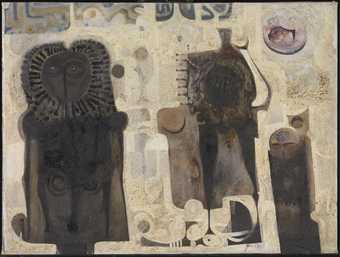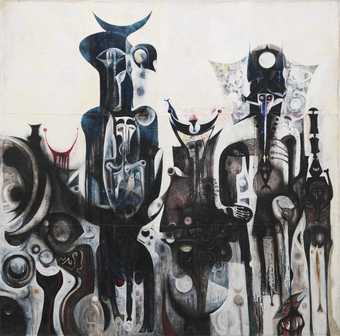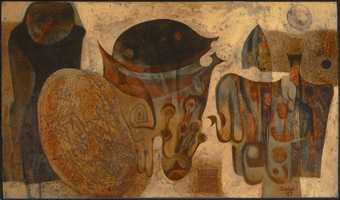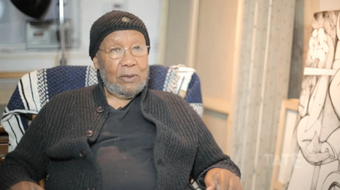M1: They said they wanted me to go to the head of security, who wants me just for a couple of minutes, and those couple of minutes turned out to be six months and eight days. I was taken into Cooper Jail in Sudan, which was one of the notorious kind of jails.
A cousin of mine made the military coup to turn over the government. They thought I had something to do with him, and I didn’t. I didn’t even know that it was him.
F: Tate Modern have decided to work with Ibrahim El-Salahi because he is one of the leading figures of Arab and African Modernism. After the period in prison his practice became more sombre and he changed also how the art leads the unconscious mind of the artist to finish the work.
M1: In jail I learned that this thing that I refer to as an organic growth of a picture. We were not allowed to have paper, and I had cement casings when they brought food from our homes. And I used to make a small drawing, cut it into little bits that I could bury in the sand, little so as not to be discovered. And then I added a little bit to the right and a little bit to the left, and I add a little bit on top, to make a picture. It made me realise that there are things beyond our will, beyond our intentions, but the thing to do is to take it easy and to accept what has happened, and forget, or try to forget.
M2: His life itself went through a different transformation. How do you tell that kind of a complex story in a retrospective? So, we tried to start by highlighting some of his masterpieces, for example, The Inevitable from 1985, 1986. It’s an important piece stylistically because it is part of his mural-like, organic growth type of paintings. But it was also significant in terms of the themes it covers, as it deals with the major uprising in the history of Sudan, around 1985, ’86, the democratic period that unfortunately was short lived.
M1: I learned a great deal about myself in jail. To start with something which is a nucleus, and I have no idea what the outcome would be, quite different to the Western concept of having a sketch and then you add, and you omit, this and that…no. I start with a nucleus which is completely unknown to me what it is going to grow up into. I must have been thinking about the Sudan, about tyrants. I’m not a political animal, but I have my own ideas about what should be done and what is good. People have got to shed away tyranny. People who are being pushed down continuously have got to rise up one day and liberate themselves.




